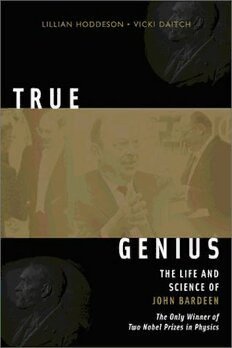
True Genius: The Life and Science of John Bardeen PDF
489 Pages·2002·10.19 MB·English
Most books are stored in the elastic cloud where traffic is expensive. For this reason, we have a limit on daily download.
Preview True Genius: The Life and Science of John Bardeen
Description:
What is genius? Define it. Now, think of scientists who embody the concept of genius. Does the name John Bardeen spring to mind? Indeed, have you ever heard of him? Like so much in modern life, immediate name recognition often rests on a cult of personality. We know Einstein, for example, not just for his tremendous contributions to science, but also because he was a character, who loved to mug for the camera. And, our continuing fascination with Richard Feynman is not exclusively based on his body of work; it is in large measure tied to his flamboyant nature and offbeat sense of humor. These men, and their outsize personalities, have come to erroneously symbolize the true nature of genius and creativity. We picture them born brilliant, instantly larger than life. But, is that an accurate picture of genius? What of others who are equal in stature to these icons of science, but whom history has awarded only a nod because they did not readily engage the public? Could a person qualify as a bona fide genius if he was a regular Joe? The answer may rest in the story of John Bardeen. John Bardeen was the first person to have been awarded two Nobel Prizes in the same field. He shared one with William Shockley and Walter Brattain for the invention of the transistor. But, it was the charismatic Shockley who garnered all the attention, primarily for his Hollywood ways and notorious views on race and intelligence. Bardeen's second Nobel Prize was awarded for the development of a theory of superconductivity, a feat that had eluded the best efforts of leading theorists, including Albert Einstein, Neils Bohr, Werner Heisenberg, and Richard Feynman. Arguably, Bardeen's work changed the world in more ways than that of any other scientific genius of his time. Yet, while every school child knows of Einstein, few people have heard of John Bardeen. Why is this the case? Perhaps because Bardeen differs radically from the popular stereotype of genius. He was a modest, mumbling Midwesterner, an ordinary person who worked hard and had a knack for physics and mathematics. He liked to picnic with his family, collaborate quietly with colleagues, or play a round of golf. None of that was newsworthy, so the media, and consequently the public, ignored him. John Bardeen simply fits a new profile of genius. Through an exploration of his science, as well as his life, a fresh and thoroughly engaging portrait of genius and the nature of creativity emerges. This perspective will have readers looking anew at what it truly means to be a genius.
See more
The list of books you might like
Most books are stored in the elastic cloud where traffic is expensive. For this reason, we have a limit on daily download.
